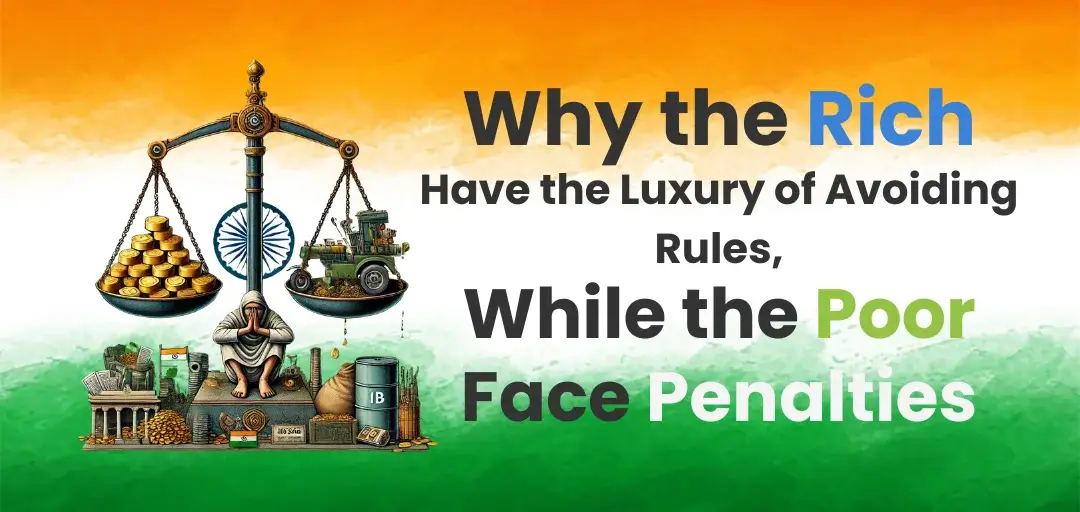Why the Rich Have the Luxury of Avoiding Rules, While the Poor Face Penalties
In societies across the globe, systemic disparities in legal and financial consequences are glaring. The wealthy often enjoy privileges that shield them from the penalties faced by the economically disadvantaged. This divide isn’t merely anecdotal; it’s deeply ingrained in our systems, perpetuating a cycle of inequality.
The Legal System: A Double Standard
The legal system is often touted as a bastion of fairness, blind to wealth or status. However, in practice, systemic disparities ensure that the rich and poor face vastly different outcomes when dealing with the law.
Access to Quality Representation Wealthy individuals can afford the best legal teams, who are adept at exploiting legal loopholes and negotiating favorable settlements. In contrast, economically disadvantaged individuals often rely on overburdened public defenders, leading to less favorable outcomes.
Bail and Pretrial Detention Cash bail systems disproportionately affect the poor. Wealthy individuals can pay bail and await trial in the comfort of their homes, while the poor often remain incarcerated, regardless of guilt or innocence. This disparity perpetuates systemic disparities by penalizing poverty itself.
Sentencing Disparities Research has shown that socioeconomic status influences sentencing. Wealthy individuals are more likely to receive lighter sentences or alternative punishments, while the poor face harsher penalties for similar offenses.
Financial Systems: Built for the Privileged
The financial landscape also reveals systemic disparities that favor the wealthy. From tax laws to debt systems, the rules often seem tailored to benefit those at the top.
Tax Avoidance vs. Tax Evasion The wealthy have access to sophisticated strategies and professionals who help them avoid taxes legally. Tax shelters, offshore accounts, and loopholes are tools of the rich. In contrast, the poor and middle class, with limited resources, are left to bear the brunt of tax burdens and face audits more frequently.
Debt and Credit Systems Poor individuals often face exorbitant interest rates and predatory lending practices. Meanwhile, the rich leverage low-interest loans and investments to grow their wealth. These systemic disparities widen the financial gap over time.
Bankruptcy Laws While bankruptcy can offer a fresh start, the process is far easier for corporations and wealthy individuals who can afford high-quality legal advice. For ordinary citizens, bankruptcy often comes with stigma and long-term financial consequences.
Societal Impacts of Systemic Disparities
Erosion of Trust Systemic disparities erode trust in institutions. When people perceive the legal and financial systems as favoring the rich, social cohesion deteriorates.
Reinforcement of Inequality These disparities perpetuate cycles of poverty and privilege. The wealthy pass on their advantages to future generations, while the poor struggle to break free from systemic barriers.
Social Unrest Perceived injustices can lead to widespread dissatisfaction and even unrest. Movements like Occupy Wall Street highlight the frustration many feel about systemic disparities.
Addressing Systemic Disparities
Legal Reforms
Implementing universal access to quality legal representation.
Reforming cash bail systems to prevent wealth-based detention.
Ensuring sentencing guidelines are applied uniformly.
Financial Reforms
Closing tax loopholes that disproportionately benefit the wealthy.
Regulating predatory lending practices.
Simplifying bankruptcy laws for individuals.
Education and Advocacy
Raising awareness about systemic disparities.
Advocating for policies that promote equity.
Encouraging civic engagement to hold institutions accountable.
Conclusion
Systemic disparities in legal and financial consequences are deeply rooted, favoring the rich while penalizing the poor. Addressing these disparities requires comprehensive reforms and societal commitment to equity. By acknowledging and tackling these issues, we can work toward a fairer, more just society.
Throughout this blog, the focus has been on highlighting the systemic disparities that underlie inequality. By recognizing these issues and advocating for change, we can challenge the status quo and create a more equitable future.
Our GST Services

All E-commerce Tax services
E-commerce tax services help online sellers navigate GST registration, compliance, return filing, TCS management, tax planning, and audits, ensuring efficient tax management and legal compliance.

GST Filing
GST filing is the process of submitting tax returns to the government, detailing sales, purchases, and taxes paid or collected, ensuring compliance with GST laws.

GST Registration
GST registration is the process where businesses obtain a GSTIN from the government, allowing them to collect taxes, claim input tax credits, and comply with GST laws.





